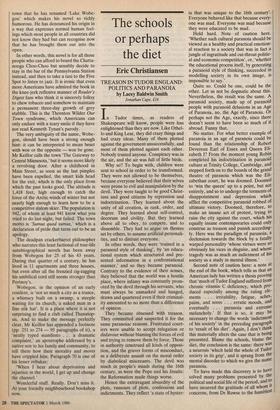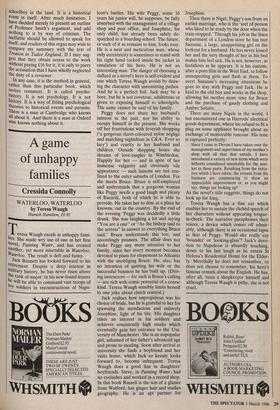The schools or perhaps the diet
Eric Christiansen
TREASON IN TUDOR ENGLAND: POLITICS AND PARANOIA by Lacey Baldwin Smith
Jonathan Cape, 176
In Tudor times, as readers of Shakespeare will know, people were less enlightened than they are now. Like Othel- lo and King Lear, they did crazy things and had crazy ideas. Many of them plotted against the government unsuccessfully, and most of them plotted against each other. Nobody trusted anyone. Conspiracy was in the air, and the air was full of little birds.
Why so? To begin with, children were sent to school in order to be transformed. They were not allowed to be themselves, because everyone believed that their selves were prone to evil and manipulation by the devil. They were taught to be good Christ- ians and good citizens by repression and indoctrination. They learned about the unity of all creation, in rank, order, and degree. They learned about self-control, decorum and civility. But they learned above all to obey, to compete, and to dissemble. They had to argue on themes set by others, to assume artificial personali- ties, and to distrust everyone.
In other words, they were 'trained in a paranoid style of thinking', by 'an educa- tional system which structured and pre- sented information in a confrontational manner,' and so they became paranoid. Contrary to the evidence of their senses, they believed that the world was a hostile place, where infamy was constantly prom- oted by the devil through his servants, who must always be unmasked and hanged, drawn and quartered even if their criminal- ity amounted to no more than a difference of opinion.
They became obsessed with treason. They committed and suspected it for the same paranoiac reasons. Frustrated court- iers were unable to accept relegation or disfavour without blaming the forces of evil and trying to remove them by force. Those in authority construed all kinds of opposi- tion, and the graver forms of misconduct, as a deliberate assault on the moral order by diabolical miscreants. The devil was much in people's minds during the 16th century, as were the Pope and his Jesuits: the Reformation made things worse.
Hence the extravagant absurdity of the plots, rumours of plots, confessions and indictments. They reflect 'a state of hyster- ia that was unique to the 16th century'. Everyone behaved like that because every- one was mad. Everyone was mad because they were educated to be mad.
Hold hard. Note of caution here. 'Whether such cultural paranoia should be viewed as a healthy and practical emotion- al reaction to a society that was in fact a jungle of ingratitude and cut-throat politic- al and economic competition', or, 'whether the educational process itself, by generating a paranoid style of thinking, succeeded in modelling society in its own image, is impossible to say.'
Quite so. Could be one, could be the other. Let us not be dogmatic about this. Nevertheless, the result was the same. A paranoid society, made up of paranoid people with paranoid delusions in an Age of Paranoia, no, the Age of Paranoia. Or perhaps not the Age, exactly, since there doesn't seem to have been so much of it abroad. Funny that. No matter. For what better example of paranoia in an age of paranoia could be found than the relationship of Robert Devereux Earl of Essex and Queen Eli- zabeth I? From the moment young Robin completed his indoctrination in paranoid culture at Trinity College, Cambridge, and stepped forth on to the boards of the grand theatre of paranoia which was the Eli- zabethan court, he was doomed. Doomed to 'win the queen' up to a point, but not entirely, and so to undergo the torments of disappointment and depression which afflict the competitive paranoid robbed of ultimate victory. Doomed, therefore, to make an insane act of protest, trying to raise the city against the court, which his equally insane contemporaries could only construe as treason and punish according- ly. Here was the paradigm of paranoia, a declension towards the block by a fatally warped personality 'whose virtues were so obviously his vices in disguise, and whose tragedy was as much an indictment of his society as a study in mental illness.' Second note of caution here: a note at the end of the book, which tells us that an American lady has written a thesis proving that 'much of Tudor England suffered from chronic vitamin C deficiency, which pro- duced especially among the ruling ele- ments . . . irritability, fatigue, aches, pains, and sores . . . erratic moods, and eventually . . . paranoia and extreme melancholy.' If that is so, it may be necessary to change the words 'indictment of his society' in the preceding paragraph to 'result of his diet'. Again, I don't think this materially alters the case that is being presented. Blame the schools, blame the diet, the conclusion is the same: there was a neurosis 'which held the whole of Tudor society in its grip', and it sprang from the mental disorder to which we give the name paranoia. To have made this discovery is to have solved many problems presented by the political and social life of the period, and to have incurred the gratitude of all whom It concerns, from Dr Rowse to the humblest schoolboy in the land. It is a historical event in itself. After much hesitation, I have decided merely to present an outline of Professor Smith's argument, and add nothing to it by way of criticism. The ineffable should be allowed to speak for itself, and readers of this organ may wish to compare my summary with the text of Treason in Tudor England. If I may sug- gest that they obtain access to the work without paying £16 for it, it is only to parry the accusation that I have wholly neglected the duty of a reviewer.
In any case, it is the method in general, rather than this particular book, which Invites comment. It is called psycho- history. It is not psychology. It is not history. It is a way of fitting psychological theories to historical events and persons. There is a man at Cambridge who knows all about it. And there is a man at Oxford who knows nothing about it.















































 Previous page
Previous page